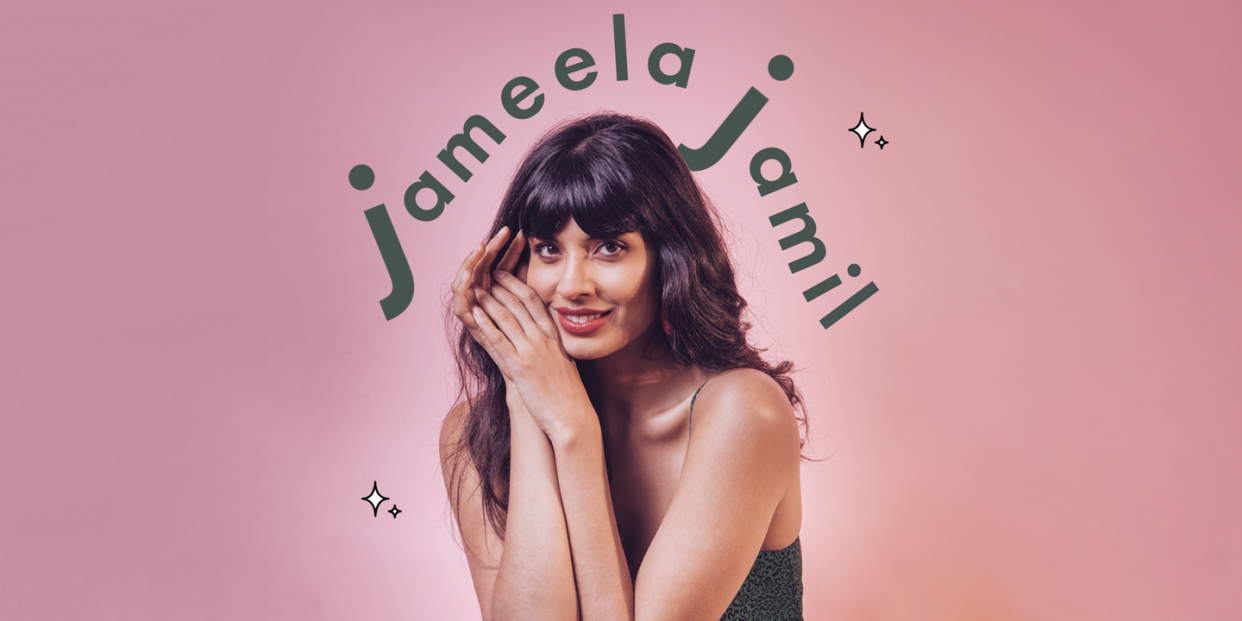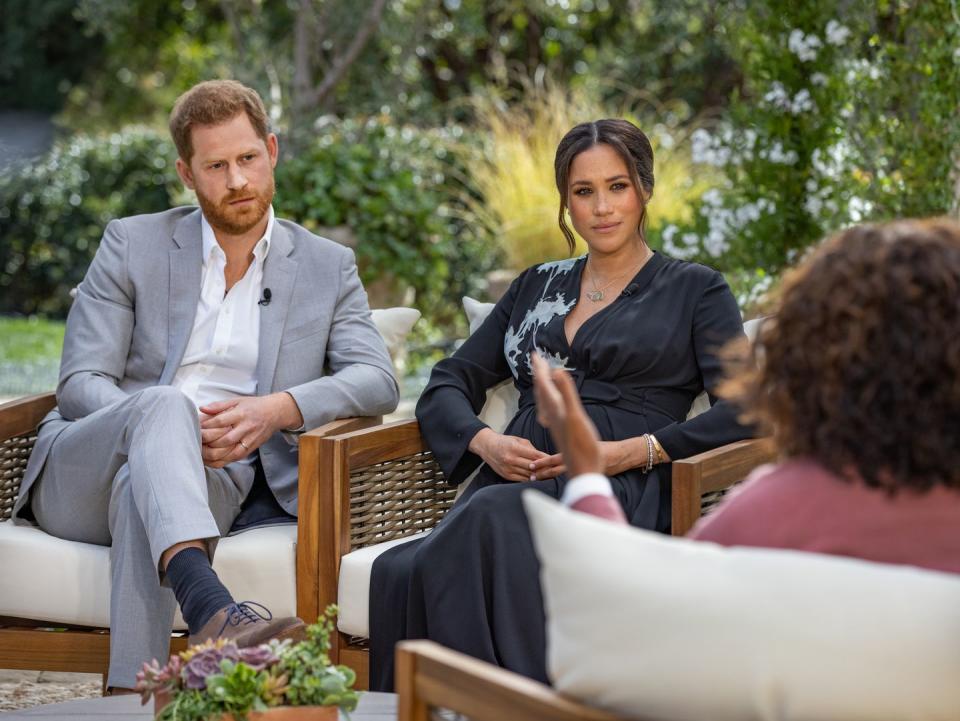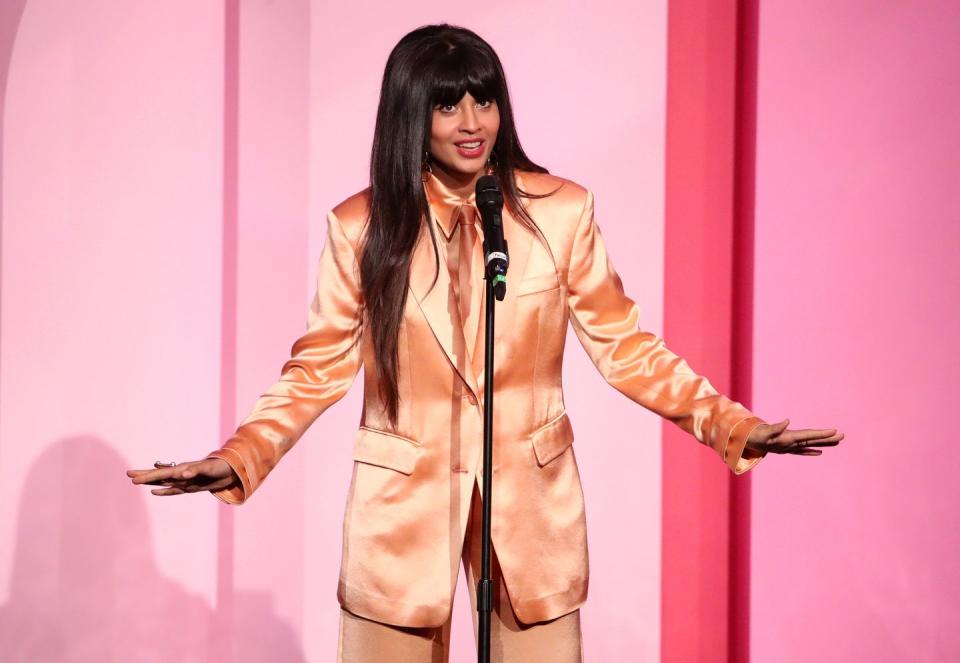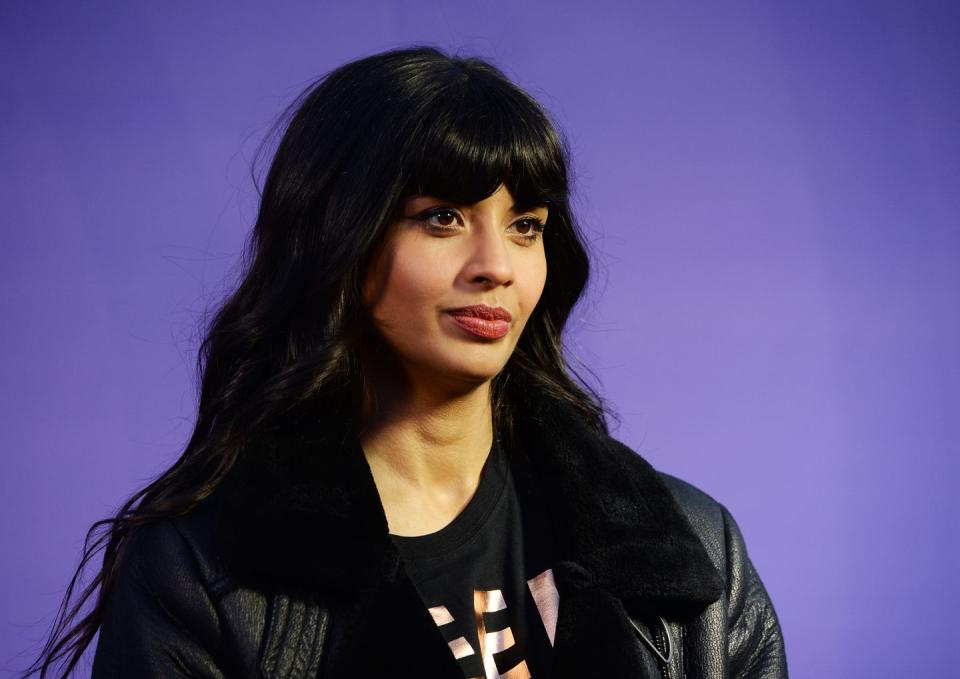Jameela Jamil: 'Meghan and Harry are an amazing example of self-preservation and family'

Feminist, inspirational force of nature, fierce cheerleader: enter Jameela Jamil. It’s just gone 8am in Los Angeles when we speak. Me on Zoom, and Jameela from the home she shares with her boyfriend, musician James Blake, as well as six friends from London who she's known since she was 19.
I ask her how she’s finding Hollywood. “I stay removed from the industry a little bit because it still isn’t entirely pure,” Jameela laughs. “And I’ve got my old mates from London here, so it’s like I’ve just transported some of my favourite bits of England and home to LA.”
The former T4 and Radio 1 presenter moved to LA in 2016 to pursue a career in comedy writing, but instead ended up landing a role on award-winning show The Good Place after her agent insisted she attend the audition. As well as acting, Jameela is the founder of the powerful I Weigh movement where she passionately champions diverse voices and body positivity.
A testament to her activism, Jameela is currently the face of The Body Shop Self Love Uprising campaign which encourages people to spread love and positive change around the world. Over the course of our Zoom chat, it’s hard to picture a better person for the position.
“The more women we encourage and celebrate when they speak out, the more chance we have of coming together and ending the toxicity of misogyny,” she tells us - and we couldn’t agree more.
We also speak about Prince Harry and Meghan Markle, of whom Jameela has always been a vocal supporter, and what she hopes will come from their headline-dominating Oprah Winfrey interview. As their highly anticipated two-hour watch finally airs, here’s what she had to say:

Meghan Markle and Prince Harry are a great example of choosing a path of self-love. Why do you think so many people have such a problem with their decision?
“I think maybe some people feel jealous when they watch other people rebel. I think it makes them feel uncomfortable. So many of us stay in line and tolerate things that we don’t have to because we’ve been conditioned to - especially the Brits. You know, we’ve got a stiff upper lip, chin up, just grin and bear it - or don’t even grin! We’re conditioned to never step out of line.
“I don’t know what the media expected from two people? To just sit and tolerate that forever? I think they are an amazing example of self-love, self-preservation and family and I’m really happy that our generation has got that level of self-respect to look up to now. Like, you’re allowed to leave. So many people in the last year especially are trapped in houses with people that are toxic and bad for them, so maybe they offer hope and courage to some of those people to leave when this is over.”
What long-term impact do you hope Harry and Meghan’s Oprah Winfrey interview will have?
“I just hope that we continue to have more and more people speak out when they are subjected to abusive behaviour. These things continue if we stay silent about it. That’s when an abuser has the most power over you. Be that the media, be that the family or your boss. Whoever it is, if you keep their bullying private and secret then they have free reign over you. I think calling it out makes it easier to identify and then deconstruct, and that goes the same for our inner bully.”
“We have shamed victims out of talking about their silence and their trauma for too long. We’ve seen it throughout the Me Too movement and Black Lives Matter protests, we made people feel bad for just complaining that they’re not being treated like human beings, so that needs to stop and that’s what I hope comes out of this interview.”

How do you balance being supportive of other women while also calling them out, like you’ve done with the Kardashians in the past?
“I look at it as really calling other women in. I get criticised by women and I never consider them unfeminist for checking me. I consider it to be a compliment that they think I have room to improve. We should only ever criticise people in the hope they are going to change because we believe they are going to do better. I think it’s a really toxic idea that if you ever criticise another woman and you are a woman you are not feminist - I think it’s very feminist. We all have certain areas of ignorance, we all make mistakes and all of our internalised trauma sometimes bleeds out of us onto other people without us even realising. I think it’s really important for us to check each other, and I sure as shit would rather be checked by a woman than a man. So I’m all for it.”

What’s your advice for people who are struggling with self-love?
“I think it’s just so important to identify your inner bully and really listen to what it’s saying to you. When you’re alone with it in front of the mirror in your bedroom, ask yourself: would I ever say that to someone that I love? Would I ever tell my mum that she’s too fat for love? Or that my friend’s breasts aren’t nice enough to ever go on top during sex with the lights on? Or that my other friend is too old for a job interview or too old to start her life again and try something new, be brave and have an adventure? No, I would never say that to people I love and respect, and yet I have constantly said that to myself. Learning how to stand up for yourself the way you would stand up for another woman is an amazing way to reinforce what’s great about you.”

Would you say you're comfortable and confident with your body now?
“No, don’t be ridiculous! It would be really disingenuous for me to say so and it’s really sad that society has had such an impact that my body dysmorphia makes it nearly impossible for me to love it so far, but I’m on my way to love. Where I’m at is neutrality and acceptance. I think that forcing positivity on people with the positivity memes and just instructing someone that they have to love themselves, you’re setting them up for more failure. I think what’s better is just to let people incrementally grow towards self-love.”
How did you get to a place where being wrong doesn't faze you?
“When I’m wrong, I take it in as ‘oh ok I’m glad I know that now’. Neuroscientists teach that the most effective way you can ever learn is from a mistake. That’s how your brain is most likely to ingest new information. While we have to make sure that people are as careful as can be, we must stop feeling so embarrassed by mistakes because mistakes are often how we’re going to have lasting change. And when I haven’t done something wrong and someone is just spreading a smear campaign against me, it’s an ongoing process of learning how to digest that as not personal but actually part of a system of oppression against women.
“We target women, we smear them, we’ve seen it happen to Meghan this week, we saw it happen to Britney Spears in that documentary and we saw it happen to Paris Hilton, to Lindsay Lohan, Anne Hathaway... There is a refined template and system that builds women up specifically to tear them down. Because I’m thankfully in my thirties I’m old enough to know that pattern and have watched enough women in my own time in front of me fall victim to that pattern, so I know how to survive it. I’m very grateful for that and now I’m going to tell everyone what I’ve seen and what I know.”

Was there a pivotal moment when you realised you wanted to become a self-love spokesperson?
“I never thought I would ever become a spokesperson. I think I just felt like a lot of people in this world and wanted to contribute my voice to calling out what I thought was unfair. I never planned on being a leader; I left school at 16 and I don’t have any practice at this. There isn’t exactly a template for an entertainer to use their platform to talk about these sorts of things, so I’ve just been trying to speak up. You know, when you see it, say it, basically."
How much progress do you think we’re making as a society when it comes to self-love and speaking up?
“I think we’re making tremendous progress. I think our value systems have shifted in the last year; I think we’re learning gratitude from each other for our bodies, I think we’re not taking things for granted any more. I think we’ve realised that celebrities can be useless. I think that front line workers are legends and they should be the ones that we glorify and hold awards ceremonies for. I also think when it comes to actual self-love, The Body Shop Self-Love Index shows that statistically things are improving in the way people feel about themselves, and so I feel quite hopeful.
“I think the more women we encourage and celebrate when they speak out, the more chance we have of coming together and ending the toxicity of misogyny. I never planned on being the loudest voice or being a spokesperson. I was hoping that if I spoke it would encourage others to speak too, and that’s still what I’m hoping for. I just want for us all to fight this together. To love ourselves a bit, you know?"
Jameela Jamil is one of the leading lights supporting The Body Shop global self-love campaign. The activist beauty company believes self-love is the next frontier in creating positive change in the world and hopes to inspire one million acts of self-love in one year.
Find out more at www.thebodyshop.com/selflove and @thebodyshop #SelfLoveUprising
Cosmopolitan UK's current issue is out now and you can SUBSCRIBE HERE.
Like this article? Sign up to our newsletter to get more articles like this delivered straight to your inbox.
You Might Also Like

 Yahoo Movies
Yahoo Movies 
